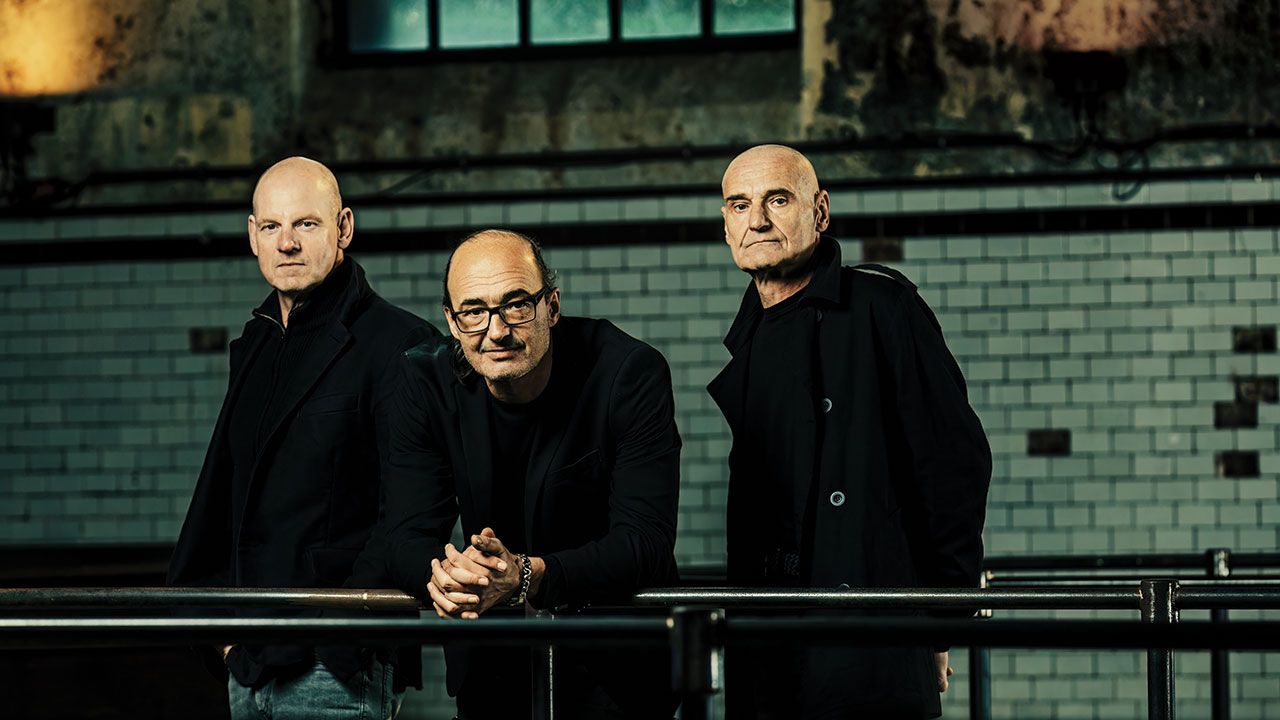The 100 Greatest Prog Songs Of All Time
What is the greatest prog anthem of all time? We asked you – and prog's leading artists – to vote for your favourites…
Select the newsletters you’d like to receive. Then, add your email to sign up.
You are now subscribed
Your newsletter sign-up was successful
Want to add more newsletters?
39) The Revealing Science Of God (Dance Of The Dawn) - Yes
from Tales From Topographic Oceans (Atlantic, 1973)
This 20-minute-plus epic combines religious imagery with lyricism about the ongoing Vietnam War. The band are in a highly experimental state, with Jon Anderson building his vocals into a Gregorian choral chant, while Steve Howe’s fluent guitar solo has an existential feel. Breathtaking and bold, this is inspired.
You say: “Greatest lyrics and possibly the greatest Mellotron song ever.” Alexi Kaltto
38) Mocking Bird - Barclay James Harvest
from Once Again (Harvest, 1971)
Who says prog rock can’t do yearning love songs? John Lees’ plaintive piece might be a lullaby to a child or a stormy epic about a relationship pulled apart. Though initially intimate, Robert John Godfrey’s rhapsodic, orchestral fantasia lend the song a surging, widescreen drama. A cornerstone of BJH’s career.
You say: “Absolutely beautiful – the first and greatest symphonic prog song.” Francis Sorren
37) Crystallised - Haken
from Restoration EP (InsideOut, 2014)
Sign up below to get the latest from Prog, plus exclusive special offers, direct to your inbox!
A prodigiously sprawling work from the London sextet, expressing the breadth of their influences and the scope of their ambitions. Like a prog black hole absorbing everything around it, Crystallised pulls in Canterbury folk, weird funk, and heavy syncopated riffs worthy of Tool, all bundled up with a mammoth chorus.
You say: “Everything from emotionally-moving lyrics and lightning fast but still melodic guitar solos, to complex experimental passages and beautiful vocal harmonies.” Herman Klug
36) Carpet Crawlers - Genesis
from The Lamb Lies Down On Broadway (Charisma, 1974)
Intimate yet apocalyptic, the way Peter Gabriel creates a surreal image of the main character Rael dealing with ascending through mental levels towards a mirage of aspiration is astonishing. Gabriel’s vocals are sparsely parched, set against a lilting piano background from Tony Banks. It has a cunningly simple pop tune.
You say: “They most beautiful and haunting song Genesis (and I’m tempted to say anyone) have ever made.” Pablo Alvarez
35) Fugazi - Marillion
from Fugazi (EMI, 1984)
Prophets, visionaries and poets everywhere heard Fish’s rallying call as Marillion’s gold-certified second album found a way to bring fresh 80s attack to classic prog complexity, drama and wordplay. Music hadn’t witnessed melodrama like this since Gabriel was wearing fox heads. Impeccably indulgent, and at the vanguard of prog’s second coming.
You say: “The classic line-up of Marillion at their angry, claustrophobic best.” Simon Cask
34) Metropolis Part 1: “The Miracle And The Sleeper” - Dream Theater
from Images And Words (Atlantic, 1992)
A defining early statement from one of modern prog’s true standard bearers. Initially, they channel power metal melodrama with help from James LaBrie’s piercing operatic howl, before Mike Portnoy’s scattergun bass drum and John Petrucci’s sparky fretwork show us something more intriguing is afoot, and by the time they wade into hopscotching jazz rock waters, anything seems possible.
You say: “Nowhere is Dream Theater’s musical interplay demonstrated better than this. It’s nine-and-a-half minutes of pure progressive extravagance.” Matthew Sielaff
33) La Villa Strangiato - Rush
from Hemispheres (Mercury, 1978)
Subtitled An Exercise In Self-Indulgence, this is Rush’s first purely instrumental track. Divided into 12 sections, it is inspired by a dream Alex Lifeson had. It rises from a gentle guitar opening through increasing complexity, climaxing with a phased rhythmic drive that ends abruptly, rather like waking from a dream.
You say: “One of the most powerful musical moments in the band’s history with Alex’s soulful guitar solo taking centre stage, and crazy cool, finger snapping jazz breaks for good measure.” James Davies
32) Anesthetize - Porcupine Tree
from Fear Of A Blank Planet (Roadrunner, 2007)
A supremely moody piece digs into the emptiness at the heart of a technologically spoilt, emotionally starved generation in the 17-minute centrepiece of Fear Of A Blank Planet. Alex Lifeson’s guest solo adds an extra touch of class, but Wilson bleats ‘I’m totally bored but I can’t switch off.’ In contrast, we’re pretty much consumed from beginning to end.
You say: “One of Porcupine Tree’s most epic songs. It takes the listener from a calm but dark melody to an angry metal anthem and back to a sorrowful gentle tune.” Daniel Jaramillo
31) The Whirlwind - Transatlantic
from The Whirlwind (InsideOut, 2009)
Modern prog’s premier supergroup return from their hiatus with Neal Morse’s religiously charged lyrics more prominent than ever on a 77-minute super-suite. Yet the transcendent choruses and gobsmacking instrumental mazes retain infinite depths that can stir even the most secular of souls – no bland or preachy ‘Christian rock’ here.
You say: “Neal Morse’s writing, the meaning behind it, and it all coming together at the end is nothing short of genius.” Phil Windle
30) Grendel - Marillion
from Market Square Heroes 12” (EMI, 1982)
Sure, it might be a little too close structurally to Supper’s Ready, but Marillion’s epic update of the Beowulf myth has a manic spirit all its own. Originally released as the B-side to the band’s debut single, Market Square Heroes, the intricate, 17-minute Grendel is the polar opposite of that song’s compact modern-day angst. Intricate and mystical, it remains legendary in every sense.
You say: “My introduction to Marillion when I heard it on Tommy Vance’s Rock Show on Radio 1. I bought the 12” single the next day, and have continued to buy just about everything they have released since.” Ken Lansdowne
29) The Musical Box - Genesis
from Nursery Cryme (Charisma, 1971)
Pastoral elements embodied by the rippling guitars and wistful flute belie the horror buried below the surface in this complex allegory of sexual repression and attempted spectral incest. Like all the best ghost stories, Genesis skillfully guide us from a sense of unease into a sudden fall and climactic resolution.
You say: “From Peter Gabriel’s theatrics and imagery to the construction of the song, this set the template for the rest of the Gabriel-era Genesis material.” Eric Beaudin
28) Dogs - Pink Floyd
from Animals (Harvest, 1977)
A composition that Pink Floyd first started work on in 1974, this was originally going to be titled You’ve Got To Be Crazy. But this was altered to fit into the concept on Animals. This tackles the way in which big business turns people into raging dogs. It manages to be both dispassionate yet also angry. At a time when punk was high profile, Floyd successfully merge progressive notations with bile and vitriol.
You say: “So dark and dreamlike at the same time.” Jeremy McMillan
27) Lateralus - Tool
from Lateralus (Volcano, 2001)
Only Tool could pen a labyrinthine skronkmetal exploration inspired by mathematical phenomenon, the Fibonacci integer sequence. As Maynard Keenan urges us to “swing on the spiral of our divinity”, his band stretch out across nine mesmerising minutes of vivid geometric hallucinations. Maths + prog = triumph.
You say: “Math and Tool make for one proggy combination.” Manas Sharma
26) And You And I - Yes
from Close To The Edge (Atlantic, 1972)
One of the last times Yes all wrote together in the same room, And You And I is a prime example of their ability to create coherent structures from disparate elements. Steve Howe’s acoustic chord sequences – the first step for many a budding progger – and Jon Anderson’s vocal lines come up against Squire and Bruford’s slow monolithic Eclipse section, inspiring the ensemble onto spectacular melodic peaks with synth, mellotron and sweeping pedal steel.
You say: “Almost the pinnacle of prog.” Paul Swanton
25) The Invisible Man - Marillion
from Marbles (Intact, 2004)
Take what you will lyrically from Marbles’ opening track – a relationship of neglect, the impersonal, powerless nature of modern life, or a timeless sci-fi concept of a dead man walking. Either way, its sense of alienated yearning and gentle despondency makes for one of the band’s most emotionally stirring quarter-hours.
You say: “A multi-sectioned song which takes one on a journey of despair, hopelessness and loss.” Wilton Said
24) Xanadu - Rush
from A Farewell To Kings (Mercury, 1977)
Be careful what you wish for is the message behind Rush’s cautionary tale of the unlucky fellow who discovers the secret to eternal life only to long for death. It’s a gloriously ambitious composition with the group adding tubular bells, a glockenspiel, and synthesisers aplenty to their power trio sound.
You say: “Who needs Samuel Taylor Coleridge when you’ve got Lee, Lifeson and Peart? Kublai Khan would be proud at the luxury of this classic.” Steven Morton
23) Lady Fantasy - Camel
from Mirage (Deram, 1974)
One of the band’s most renowned compositions, it tells the story of an unrequited love interest. Now, this might seem a trite notion for band of Camel’s sensibilities, but it’s used as a framework on which is built a majestic musical journey. Andrew Latimer’s thrusting guitar evocation is a counterpoint to his softly mournful vocal tone. And Peter Bardens’ keyboards have a dream-like quality, helping to shape a signature triumph.
You say: “I love everything about this track: all four members’ playing, the lyrics, the hard rocking finale. Grade A prog.” Jonathan ‘JS’
22) Roundabout - Yes
from Fragile (Atlantic, 1971)
Bookended by Steve Howe’s acoustic guitar, powered by Chris Squire’s knotty bass line and newcomer Rick Wakeman’s chunky keyboards, Roundabout took Yes into bold, new territory – namely the singles chart. It’s hardly surprising; the structure may be labyrinthine and the musicianship shamelessly grandiose, but the refrain is hugely, irresistibly infectious.
You say: “It contains musical complexity while continuing to be the perfect introductory song into the fantastic world of prog…” Regan Fox
21) A Change Of Seasons - Dream Theater
from A Change Of Seasons EP (EastWest, 1995)
Originally mooted for inclusion on the band’s breakthrough album Images And Words, Dream Theater’s A Change Of Seasons more than holds its own as a stand-alone work. Inspired by the death of then-drummer Mike Portnoy’s mother, it’s a meticulously crafted exploration of prog metal’s outer limits, embellished with dialogue taken from the film Dead Poet’s Society and executed with Dream Theater’s customary grace and precision.
You say: “The epic prog piece against which all others ought be measured. Masterfully crafted, both musically and lyrically, it conveys to the hearer a message of loss and hope.” Chris Files
20) Tarkus - ELP
from Tarkus (Island, 1971)
Tarkus is ELP in excelsis, a 20 minute suite with Keith Emerson’s Alberto Ginastera-inspired 5/8 instrumental passages linking three Greg Lake songs. It features some of the trio’s most spontaneous playing on Mass and the majestic King Crimson-ish ballad, Battlefield. This musical tale of the life and death of a heavily armoured armadillo – that’s prog for you – is vividly captured by engineer Eddy Offord on the group’s most exciting recording.
You say: “Super musicianship. Not one single note too many.” Jean Claude Van Crae
Current page: The 100 Greatest Prog Songs (#39-20)
Prev Page The 100 Greatest Prog Songs (#60-40) Next Page The 100 Greatest Prog Songs (#19-11)Prog magazine is proud to be at the forefront of the modern-day progressive music revival, continuing to celebrate one of the most invigorating and inventive forms of rock music of the last 50 years. It offers in-depth and behind-the-scenes stories of classic albums and tours alongside widespread coverage of what‘s happening at today’s cutting edge of progressive music.

